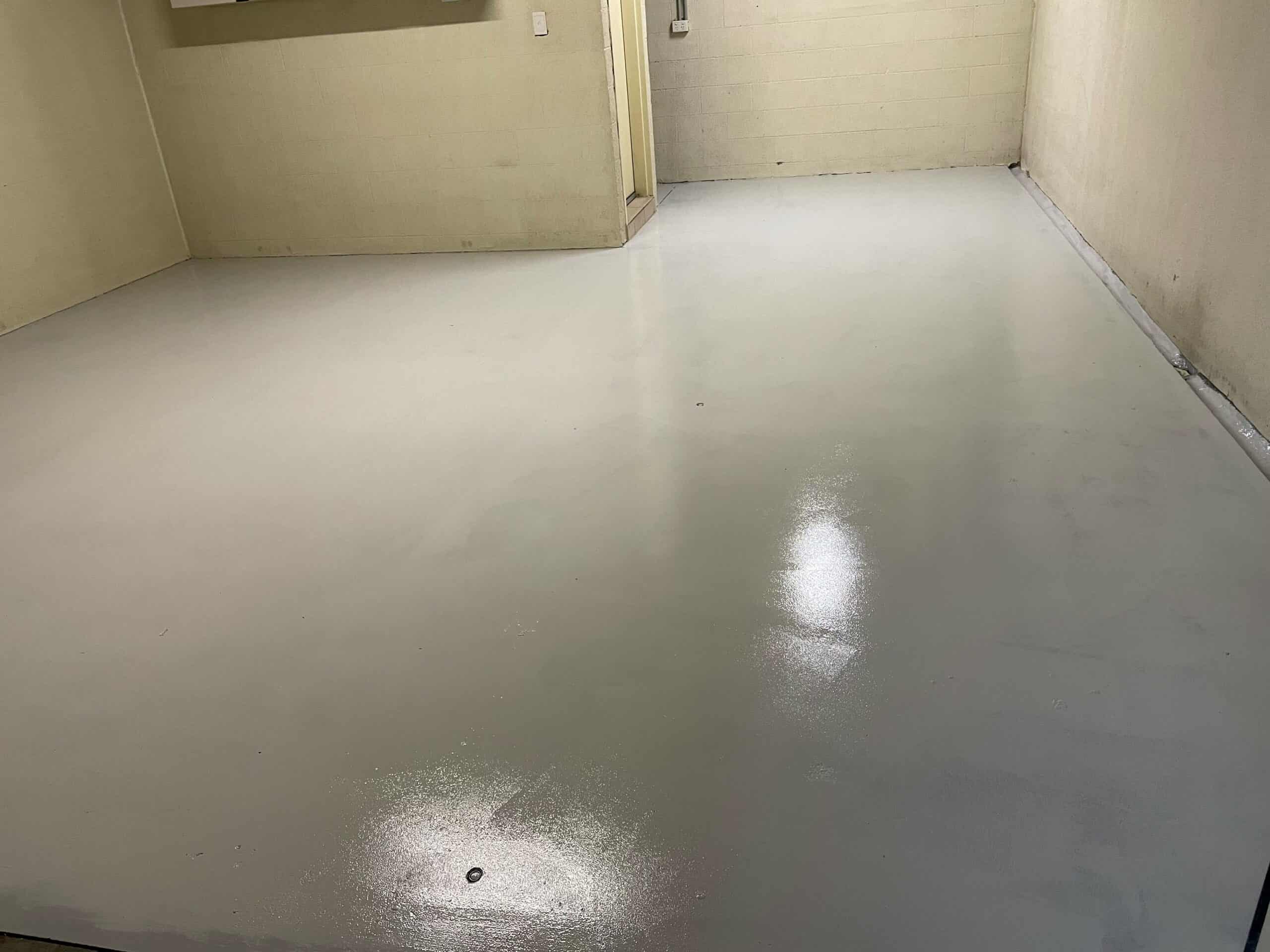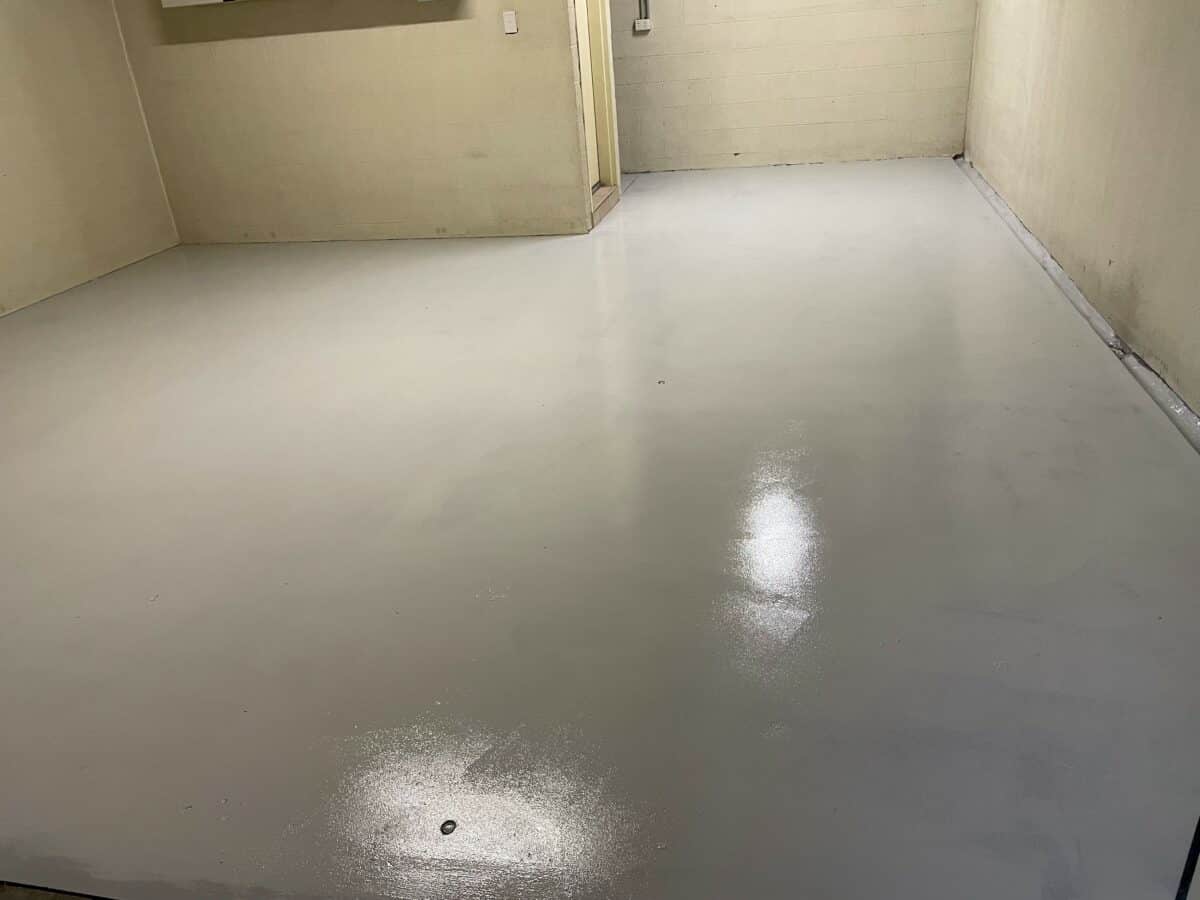The Pros & Cons Of Epoxy Flooring
In this post, we’ll dive into all the details surrounding the pros and cons of epoxy flooring. We aim to help you decide if it’s right for your flooring needs.
Are you considering installing an epoxy floor in your home or workspace? It’s a great way to give any space a stylish, modern appeal and protect the underlying surface against wear and tear from spills, foot traffic, and heavy machinery. Epoxy flooring has become a popular solution for various settings, from homes to commercial buildings and industrial facilities. This type of flooring is created by applying a combination of resins and hardeners that make a durable, shiny surface.
While epoxy flooring has many advantages, weighing the benefits against the drawbacks is essential before deciding. Before taking the first step with this project, you must understand the pros and cons of epoxy flooring to make an educated decision.

Pros Of Epoxy Flooring
Customizable
Epoxy flooring is a versatile solution gaining popularity in commercial and residential settings. One of the significant benefits of epoxy flooring is its customizability. This type of flooring can be customized to fit the unique needs of any space, whether it’s a vibrant-colored floor for a commercial space or a sleek, seamless design for a residential garage.
Epoxy flooring can be applied in various colors and patterns, so the design possibilities are endless. Additionally, epoxy flooring is durable and resistant to stains, making it easy to maintain its original appearance for years. With its customizable options, epoxy flooring is a wise investment for any space looking for a long-lasting, attractive flooring solution.
Durable
Epoxy flooring has become increasingly popular due to its durability. This type of flooring offers a strong and long-lasting surface that can withstand high-traffic areas, heavy equipment, and even harsh chemicals. Combining epoxy resin and hardener creates a tough, resilient coating that protects the underlying concrete or other surface.
In industrial settings, epoxy flooring is a popular choice due to its ability to maintain its high-performance level even in extreme conditions. It saves on maintenance costs and helps prevent accidents and downtime. When looking for a flooring option that offers both strength and longevity, epoxy flooring is worth considering.
Economical
Epoxy flooring is a cost-effective option for several different settings. Often used in commercial and industrial buildings due to its durability and low maintenance requirements. Epoxy flooring is also a popular choice for garage floors, as it can withstand heavy vehicle traffic and is resistant to oil and chemical spills.
Additionally, epoxy flooring can be placed directly over existing concrete floors, saving time and money during installation. In the long run, choosing epoxy flooring can be a wise financial decision, providing a durable and attractive surface for years.
Fast Application
Epoxy flooring is a popular choice for home and commercial spaces due to its many benefits, including fast application. Unlike other types of flooring, epoxy can be installed quickly and efficiently, minimizing downtime and disruption. Its efficiency is essential in commercial settings where downtime can result in lost revenue. Epoxy flooring can be applied in hours and is ready for use within a day, making it an ideal choice for busy environments.
Long Lasting
When choosing a flooring option for your home or business, longevity is undoubtedly a key factor. Fortunately, epoxy flooring boasts impressive, long-lasting properties, making it a popular choice for various spaces. Epoxy flooring is made of a two-part resin system that hardens to create a durable, seamless surface that can withstand heavy foot traffic, spills, and even chemical exposure.
With proper application and maintenance, epoxy flooring can last decades without showing signs of deterioration. Making it a cost-effective investment for any property owner. Additionally, epoxy flooring can be personalized to suit any space’s style and aesthetic preferences, making it practical and appealing.
Low Maintenance
Due to its low maintenance benefits, epoxy flooring has become a common option for commercial and residential spaces. The durable surface hardly requires any upkeep, making it an ideal choice for high-traffic areas or rooms where cleanliness is crucial. With its resistant nature, epoxy flooring, can withstand the toughest wear and tear, such as heavy machinery or harsh chemicals.
A simple sweep or mop is enough to keep the floors looking new and well-maintained. Not only does this save time and effort, but it also ensures that the flooring lasts for years.
Cons Of Epoxy Flooring
Damaged By UV Light
One significant drawback of this flooring type is its UV light sensitivity. Exposure to sunlight causes epoxy flooring to fade and become discoloured, compromising its aesthetic appeal and even leading to cracks in severe cases.
It’s essential to note that this issue affects outdoor areas and indoor spaces with large windows or skylights. While some manufacturers offer UV-resistant epoxy coatings, they are more expensive and may need more maintenance in the long run.
Fumes
One major con is the fumes emitted during installation. Epoxy flooring consists of two main components that must be mixed together before application. During this mixing process, chemical solid odours are released that can be harmful if inhaled for extended periods.
It’s essential to take proper precautions, such as wearing a respirator and ensuring good ventilation, during installation to reduce exposure to the fumes. There may be better options than epoxy flooring for those with respiratory or chemical sensitivity issues.
Long Cure Times
While epoxy flooring has many benefits, such as its durability, one of the main cons of epoxy flooring is its long cure times. Once the epoxy is applied, it can harden and cure for several days or weeks. During this time, the area must remain unused, which can be inconvenient for businesses or homeowners who need to use the space.
Additionally, if the epoxy is not allowed to fully cure, it can lead to issues with adhesion and durability. Overall, while epoxy flooring may be an excellent choice for some applications, it’s essential to consider the curing time before deciding.
Can Be Slippery When Wet
Epoxy flooring can become slippery when wet, this is important to note when deciding whether it is a suitable option for your property. This is primarily an issue in high-traffic areas where accidents are more likely to occur.
Hard to Repair
Epoxy flooring can also be challenging to repair if it becomes damaged, which can add to the maintenance cost. As a professional, it’s important to inform clients of all the potential downsides to epoxy flooring so they can decide what type best suits their needs.
The Bottomline
Epoxy flooring has many advantages, including its durability, affordability, and low maintenance requirements. Yet, it’s essential to consider the potential drawbacks, such as the potential for damage from UV light, the curing time and the ability to repair it. Ultimately, choosing epoxy flooring will depend on your specific needs and circumstances.
If you still need help deciding, or still have some concerns, give Sealing Pro a call on 0402 587 999. One of our friendly staff members will be more than happy to discuss your specific project requirements, and whether epoxy flooring is right for you.

